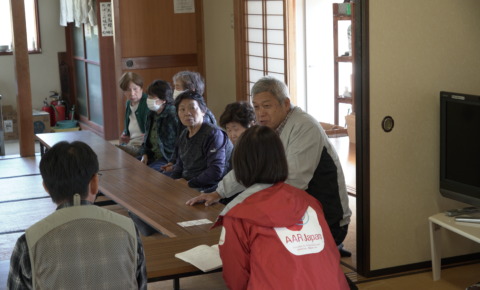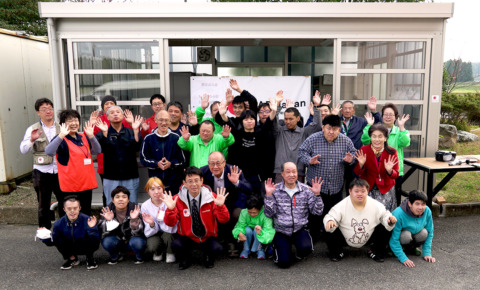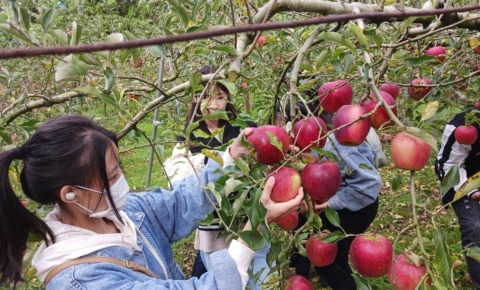Until the day survivors regain their normal lives: Three months after the Noto Peninsula earthquake
05/04/2024
Three months have passed since the Noto Peninsula earthquake struck on January 1. In the affected areas, fatalities totaled to 244, including disaster-related deaths. While the construction of temporary housing is being progressed rapidly and other efforts toward recovery is being continued, more than 8,000 people are still living in evacuation centers and approximately 13,000 people are forced to remain in their broken homes. AAR Japan (Association for Aid and Relief, Japan) began providing emergency support in Ishikawa Prefecture immediately after the earthquake, and has been continuing to support, staying close to survivors.
Mitsuru Namatame of AAR, who has been providing support in affected areas, points out that “Three months after the earthquake, the emergency phase has been shifting to the recovery phase, and the support activities also have been changing from activities such as soup kitchens and distribution of supplies to how to rebuild destroyed or partially damaged houses. However, there are still survivors who continue to live in shelters or evacuees living at their damaged homes, and the need for soup kitchens and other services has not disappeared.”
AAR’s support activities during the past three months and future initiatives are as follows.
Soup kitchen
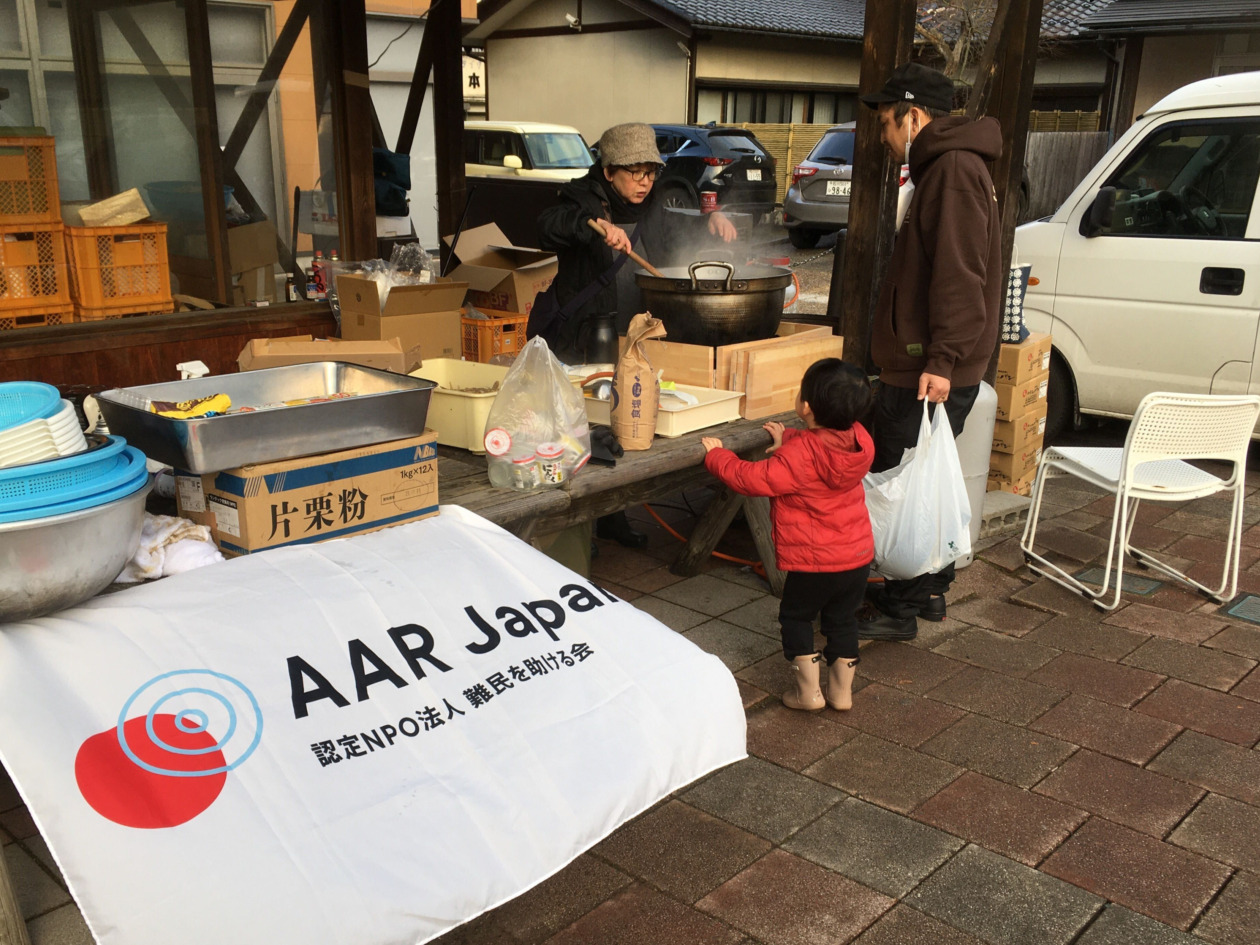
Residents of the disaster-stricken area line up for a soup kitchen run by BOND & JUSTICE, an NPO in cooperation with AAR, in Noto Town, Ishikawa Prefecture, in February 2024
On January 3, two days after the earthquake, AAR, together with our partner NPO Peace Project (Representative: Ben Kato, AAR Director), began serving food at evacuation centers. In the following three months, we have served more than 110,000 hot meals in cooperation with other organizations and volunteer groups of survivors.
A wide variety of dishes, including local dish “Tori-Yasai-Miso” (chicken and vegetable miso soup) has been very well received. The participants said, “I appreciate a hot meal on a cold day.” and “I never thought I would be able to eat something like this at an evacuation center.”
As long as there are needs from survivors, AAR will continue to provide soup kitchens in cooperation with other organizations, not only for people in evacuation centers, but also for evacuees staying at homes with no access to kitchens.
Distribution of supplies

AAR Shinichiro Ohara (left) delivers relief supplies to a meeting place in Machino district, Wajima, Ishikawa, Japan, in January 2024
In the Noto region, where transportation infrastructure was devastated, so-called “isolated communities” were scattered in mountainous areas far from urban centers where emergency assistance was difficult to reach. AAR early accessed to temporarily isolated small evacuation centers in Machino-cho, Wajima, and delivered food, drinking water, and hygiene supplies. Most of the residents of these communities are the elderly, and we supported them by carefully listening to their needs for supplies and services.
A major issue in this earthquake was the water outage due to the damage to the water supply and sewage systems. AAR delivered portable toilets, waterless shampoo and toothpaste sets, and body wiping towels donated by companies to welfare facilities for people with disabilities, elderly care facilities, and evacuation centers. Many of the recipients commented, “This is exactly what I wanted!”, and” It is very helpful for caregiving.”
Support for welfare facilities for people with disabilities

AAR staff members interviewing staff members of welfare facility about the disaster situation
In the case of a large-scale disaster, people with disabilities and the elderly, who are vulnerable even in normal times, tend to be placed in particularly difficult situations. Since AAR always consider support for them to be our priority. Our emergency support teams preferentially visited to welfare facilities in Ishikawa Prefecture to listen to their needs and delivered food, drinking water, hygiene supplies, and necessary equipment. The staff members at welfare facilities, being survivors themselves, must deal with both rebuilding the lives of their own families and rebuilding the facilities. There have been earnest requests for the facilities to be reopened as soon as possible from facility users and their families who temporarily evacuated to other locations immediately after the earthquake, but have returned from the evacuation centers. AAR is planning to repair damaged buildings and equipment at several welfare facilities.
Community support
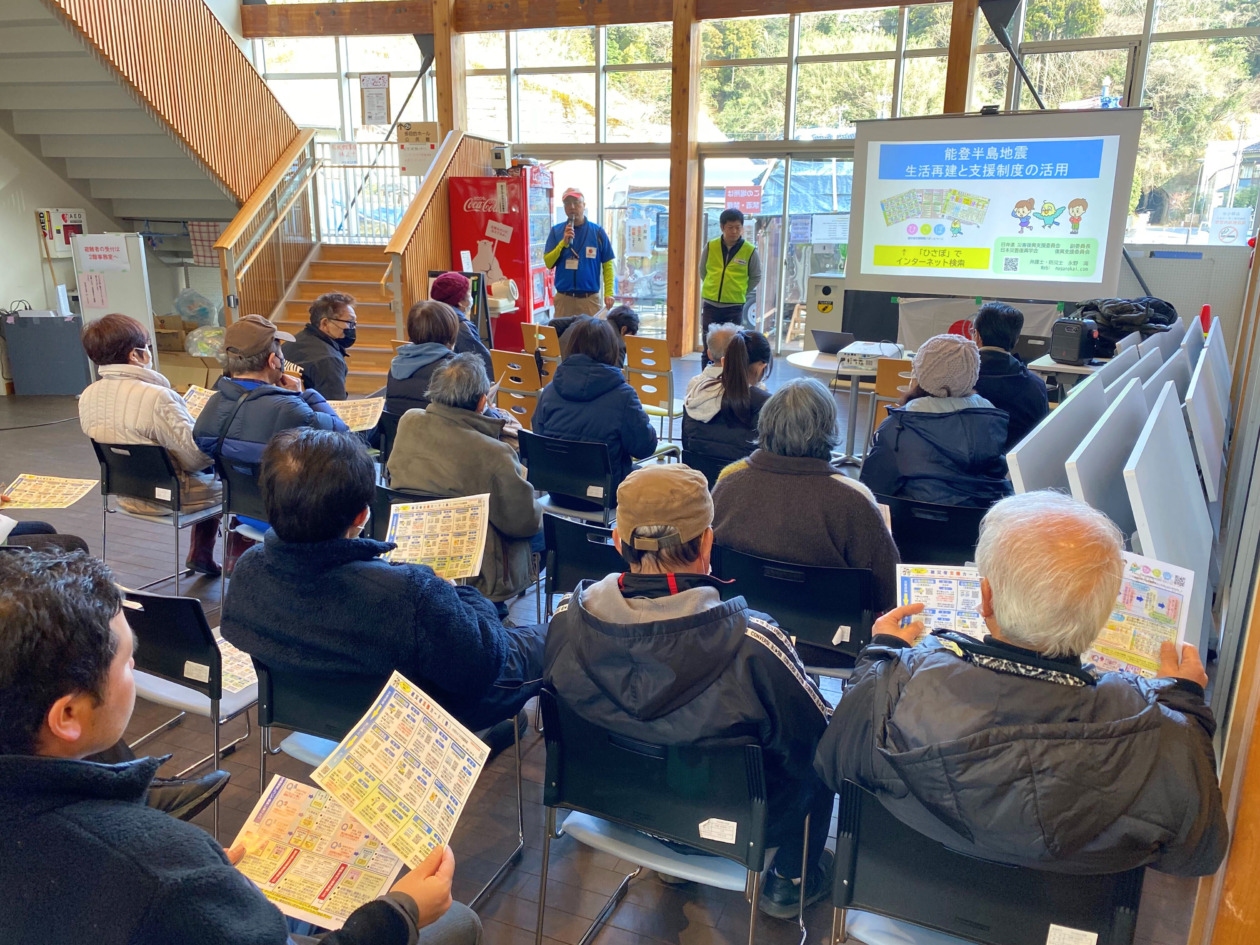
Lecture & Consultation session held at the “Concert Noto” in Noto Town, Ishikawa Prefecture. Attorney Kai Nagano (right) and AAR Shinichiro Ohara (left) in front, in March 2024
To meet the needs of survivors who are living in evacuation centers or at home, AAR is providing support such as expert massages by physical therapists and other specialists, mobile hot bath service, lectures and consultations for rebuilding lives by the attorney, and electric pumps for wells. A woman in her 70s said “I haven’t been able to take a bath for two months after the earthquake.”, and enjoyed the mobile hot bath for an hour and a half. As every lecture and consultation session by the attorney has many participants, AAR continues to hold these sessions in various locations while efforts for rebuilding lives are in full swing.
Support for Foreign Survivors

AAR Reika Horio with Indonesian technical intern trainees affected by the disaster in January 2024
Foreign residents, including technical trainees in the fishing industry, have also been affected by the earthquake. Due to language barriers, they had difficulty in adjusting to the shelters and accessing to public support information, which made them hard to reach emergency assistance. AAR delivered them food, drinking water, hygiene supplies, and fuel for heating, in order to prevent them from being isolated, in cooperation with local aid organizations. We also delivered necessary supplies to Indonesian technical intern trainees in Noto Town, who“could not buy foodstuffs and having difficulty finding drinking water due to water outage” having only a cup of noodles a day, and offered instant noodles, seasonings, and coffee made in Indonesia as well.
Support for rebuilding lives is a challenge
In the affected areas, survivors have overcome difficulties through their perseverance, positive attitudes, and the solidarity of the community in helping each other. However, while the emergency phase has passed and the reality of rebuilding their lives weighs heavily on them, their voices of such worries as “What should we do if we are not selected for temporary housing?”, “The number of local bus has been reduced and we are short of transportation”, and “I cannot sleep well at night due to anxiety about the future” are conversely on the rise. As time goes by, media coverage has decreased and people’s interest in the disaster area has waned, but the harsh situation in the affected areas still remains.
AAR Namatame says that “Even after the most difficult period has shifted to the phase of rebuilding lives, people with disabilities, the elderly, and foreign survivors most likely to be left behind. As AAR values support for survivors in the most vulnerable position, it is necessary to continue providing them steady support while deepening cooperation with local organizations and governments.
It goes without saying that the reconstruction of the affected areas requires a long time and an enormous amount of effort. AAR will not only provide emergency assistance, but will also provide medium- to long-term support by empathizing with the survivors who are struggling to regain their daily lives and by accurately capturing their needs. We appreciate your continued support for the Noto Peninsula earthquake.
Please support
We appreciate your kind donation for our emergency relief efforts in Noto Peninsula Earthquake.

